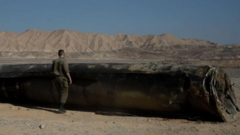A Northern England man found hundreds of sensitive British military documents scattered on a street, including soldier identities and patrol details. The Ministry of Defense is investigating the breach, highlighting concerns about the handling of national security information.
Bizarre Discovery: Sensitive British Military Documents Found on Streets of Newcastle

Bizarre Discovery: Sensitive British Military Documents Found on Streets of Newcastle
Unsecured military information raises questions about security protocols as a man stumbles upon sensitive documents while rushing to a soccer match.
As he hurried to watch a soccer game in Newcastle, Michael Gibbard stumbled upon an alarming sight: a collection of sensitive British military documents spread across an industrial street. Initially mistaking them for discarded trash, he was shocked to discover the content of the papers, which included names and ranks of soldiers, detailed base patrols, and even weapon armory codes.
“I thought, bloody hell, this shouldn’t be here,” remarked Gibbard, a 41-year-old delivery service owner, who was astonished at the level of sensitive material casually lying in the open. His unexpected find has sent shockwaves throughout a nation that prides itself on confidentiality regarding state secrets.
The documents were reportedly discovered in North East England, approximately 60 miles from Catterick Garrison, a primary military installation located in North Yorkshire. The Ministry of Defense has confirmed they are currently investigating the matter, causing concerns over military security practices.
This incident arrives at a critical time, as both the United Kingdom and its close ally, the United States, face scrutiny over their management of confidential national security data. Recently, the U.S. encountered a scandal involving the leaking of battle plans through a group chat on the encrypted platform, Signal. Contrastingly, the British breach showcases a more traditional oversight, with sensitive information left unguarded in a very public setting.
“I assumed a lot of this type of data would be managed digitally, requiring specialized military software for access,” Gibbard expressed. “To see it all printed out for anyone to access was a real eye-opener.” The British public now awaits further updates on the investigation, as implications from this incident could extend beyond negligence, raising fundamental questions about military security in the digital age.




















